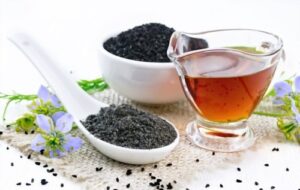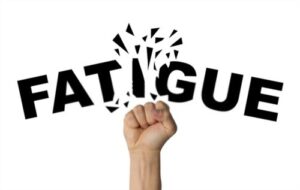Fatigue can best be described as a lack of energy and motivation, both physical and mental. It is more than simple tiredness or tiredness, which can be remedied with a quick nap, exercise or simple relaxation. 
It is a symptom and not a condition, and may be caused by a medical condition (for example thyroid disorder, heart disease, diabetes, or even a food allergy), or the combination of lifestyle (drugs and alcohol, unhealthy diet, lack of exercise, not enough sleep or too much sleep, stress at work, shift work, too much physical exertion, becoming a parent) and psychological issues (stress, depression, anxiety, grief), and a lack of total wellbeing.
Most people will experience fatigue at some point in their life, too many late nights, pushing themselves too hard physically or mentally, but this can generally be resolved with a few nights of extra rest or a holiday. However for some, fatigue lingers on, and despite getting enough sleep, eating well and regularly exercising it is still difficult to get motivated, concentrate or perform everyday tasks as easily as before.
 Symptoms of fatigue are both mental and physical and can include: chronic tiredness or sleepiness, sore or aching muscles, or muscle weakness, swollen lymph glands, loss of appetite, headache, dizziness, low motivation, inability to concentrate, dizziness, reduced short term memory, inability to make decisions, slowed reflexes, reduced immune system, irritability, blurred vision, low motivation, impaired hand-to-eye coordination, general sense of unwellness.
Symptoms of fatigue are both mental and physical and can include: chronic tiredness or sleepiness, sore or aching muscles, or muscle weakness, swollen lymph glands, loss of appetite, headache, dizziness, low motivation, inability to concentrate, dizziness, reduced short term memory, inability to make decisions, slowed reflexes, reduced immune system, irritability, blurred vision, low motivation, impaired hand-to-eye coordination, general sense of unwellness.
Globally as many as 17-24 million suffer from a condition called myalgic encephalomyelitis or chronic fatigue syndrome (ME/CFS), although it is estimated that approximately 90% of people with this condition have not been diagnosed.
 Myalgic encephalomyelitis is a condition where fatigue has been ongoing for at least six months. It is a long-term neurological disease with some similarity to autoimmune diseases. ME is more prevalent in women, and although anyone can get it, including children and adolescents, it is more common in adults between the ages of 30 – 50 years old.
Myalgic encephalomyelitis is a condition where fatigue has been ongoing for at least six months. It is a long-term neurological disease with some similarity to autoimmune diseases. ME is more prevalent in women, and although anyone can get it, including children and adolescents, it is more common in adults between the ages of 30 – 50 years old.
75% of cases are mild or moderate. It goes through cycles of flare-ups and remissions, although even on a good day there is still a feeling of fatigue.
Additional symptoms can include dizziness and rapid heart beat when rising from a sitting or laying position, often resulting in a need to lay down again, feeling terrible after any physical exercise, particularly the following day, a condition known as post-exertional malaise, or virus-like symptoms with swollen glands, sore throat, and feeling feverish and generally unwell.
People suffering from mild ME are likely to be able to continue their life with some degree of normality, and learn to adapt their lifestyle to their symptoms, although a regular routine is best, so jobs involving long commutes, or differing shifts are to be avoided as these can exacerbate the condition.
Those with moderate ME may find it difficult to function for an entire day without an afternoon sleep on some or all days. For the 25% who suffer from severe symptoms, the condition is debilitating with extreme consequences on their mental and physical abilities, and quality of life.
 The cause of ME is still unknown, although there are several theories. Inherited genetic susceptibility is possible, since it is more common in some families. It is also believed that a viral infection, for instance glandular fever, a bacterial infection such as pneumonia, a hormone imbalance, psychological stress or an abnormality with the immune system, may trigger the condition, or it could be a combination of several of these factors.
The cause of ME is still unknown, although there are several theories. Inherited genetic susceptibility is possible, since it is more common in some families. It is also believed that a viral infection, for instance glandular fever, a bacterial infection such as pneumonia, a hormone imbalance, psychological stress or an abnormality with the immune system, may trigger the condition, or it could be a combination of several of these factors.
What doctors do know is that many patients with ME have natural killer (NK) cells which function poorly, which could either be a cause or a symptom. NK cells are effector lymphocytes of the immune system that control infections by limiting their spread. The lower the functionality of these cells, the more severe the patient is affected by ME.
With ME patients the cells of the body also fail to make enough energy to sustain full functionality. Some studies have reported abnormalities in the structure of certain genes, whilst others have found an abnormality in how these genes are turned on and off, inside cells. Further abnormalities in the electrical system of the brain (brain waves), and the level of brain hormones have been seen during MRI or CT scans, although these conditions seem to be changeable and not necessarily permanent.
Studies have also indicated that patients suffer from low levels of cortisol (the primary stress hormone) which in itself can also cause weakness, fatigue, and low blood pressure. Low levels of serotonin (a major brain chemical responsible for stabilizing the mood, and a chemical precursor to melatonin, the main hormone involved in sleep) have also been indicated. Additionally low blood pressure on standing and increased heart beat have been cited, causing fainting in the worst case scenario.
 Unfortunately there is no known cure for myalgic encephalomyelitis, and some people will never recover fully. For some the symptoms will reduce over time, for others they will reduce or go into remission. Changes to lifestyle, and diet can help relieve symptoms.
Unfortunately there is no known cure for myalgic encephalomyelitis, and some people will never recover fully. For some the symptoms will reduce over time, for others they will reduce or go into remission. Changes to lifestyle, and diet can help relieve symptoms.
To help with general fatigue, and to reduce some of the symptoms of myalgic encephalomyelitis,
black seed oil can help to support and stimulate the body without adding additional toxins into an already overwhelmed body:
Black seed oil has been used for over 3000 years for its therapeutic benefits and its ability to help the body to heal itself. In Canon of Medicine, the primary medical text used throughout Europe until the 17th century, Ibn Sina, the most famous and influential Persian physician and philosopher, known as “Prince of Physicians”, stated that black seed “stimulates the body’s energy and helps in recovery from fatigue and dispiritedness.” Indeed, animal studies have upheld this belief with research comprising the effect of black seed on fatigue in exhaustive swimming tests, which affirmed the anti-fatigue properties by demonstrating energy restoration. and oxidative-stress defense.
 This oil is also rich in vitamins B6, B9 and B12, plus iron which are all vital in red blood cell formation, thus enabling oxygen to be circulated throughout the body and allowing you to feel more energised both mentally and physically.
This oil is also rich in vitamins B6, B9 and B12, plus iron which are all vital in red blood cell formation, thus enabling oxygen to be circulated throughout the body and allowing you to feel more energised both mentally and physically.
According to animal studies, black seed oil can help to support the endocrine system, increasing serotonin levels in the brain, and reducing adrenal fatigue which causes fatigue, hormone imbalance, depression and much more. Additionally the antioxidant and anti-inflammatory properties improves mitochondria (energy centres of the cells) function to reduce exhaustion, as well as boosting the immune system.
In cell studies an active compound in black seed oil, thymoquinone was shown to increase immune cell activity and antibody levels. Black seed oil increases the number of Natural Killer T (NKT) cells, which are known to function poorly in patients suffering from chronic fatigue. It is no mistake that scientists have compared the power of black seed oil with the five most powerful antibiotics.
Black seed oil is known for its antiviral, antimicrobial, antibacterial, and anti-fungal properties, thus helping to prevent what are suspected triggers for chronic fatigue. Additionally both human and animal studies have supported its anti anxiety properties, whilst also demonstrating improved cognition. Studies have also noted its ability to improve neurotoxicity and neurodegeneration.
With its ability to improve energy levels, cognitive function, reduce inflammation, oxidative stress and pain, boost the immune system and provide antimicrobial protection, black seed oil is a natural adversary for fatigue.
The power of aromatherapy should also not be overlooked. Several studies have shown that inhaling peppermint essential oil boosts energy, alertness and memory and reduces fatigue. Other oils to boost energy levels include: bergamot essential oil, cinnamon essential oil, eucalyptus essential oil and grapefruit essential oil.
Simply add a few drops to a diffuser to a tissue for direct inhalation, or to a diffuser to scent the room. Or add 5 drops to 20ml of a carrier oil and apply to your wrist for inhalation or to enjoy a soothing massage.
The best thing to remember with fatigue is to take things slowly. These things cannot be rushed, trying to achieve too much too quickly will put you back further. One step at a time, day by day, back to health.
